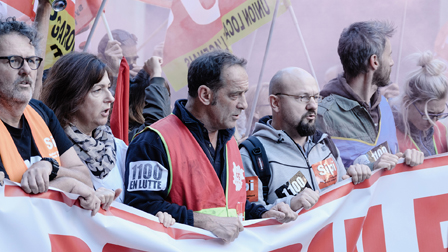“At War” (En Guerre): A French Look at Labor Relations
It is currently a time when liberal democracies around the world seem to be imploding, Brexit is tearing Britain apart, and the United States is fighting for its soul.
Yet, there are some story lines that don’t change. One is the fight waged by those who depend on manufacturing jobs to provide for their livelihoods.
In “At War” (“En Guerre”), the French film directed by Stéphane Brizé and starring Vincent Lindon, it’s not a question of a dying industry (think coal) or an issue of obsolescence. Rather, it’s a conflict between workers in an auto parts factory in the city of Agen in the southwest of France — and the suits who measure everything by shareholder satisfaction.
Just as the promises Donald Trump offered to workers at a Carrier factory in Indianapolis turned out to have little value, “At War” demonstrates that whether it is the Rust Belt in America or a region of France, employees often feel both helpless and dependent on the companies that employ them.
“At War,” which uses primarily non-professional actors, feels more like Cinéma vérité than fiction. “News segments” are regularly integrated into the narrative. This also serves as a subtext for how the media can shape the public perception of events without referencing adequate backstory.
Brizé and Lindon have worked together on previous films, including “The Measure of the Man,” for which Lindon won the Best Actor award at Cannes. As the story unfolded, I thought of the working partnership of Yves Montand and Costa-Gavras in the political thriller “Z.”
Like Montand, Lindon is not a Hollywood type. He is the embodiment of an everyman, slightly worn but still attractive. In “At War,” Lindon portrays Laurent Amédéo, the union representative and leader of the strike. When things are going well and small victories are achieved, he is respected and regarded by the others as a hero. When the fissures within the group surface, he is attacked as “being in a world of your own…with your fan club.” The fly-on-the-wall scenes of internecine arguments among the union members is typical of any group that has a continuum of opinions — but it gets bitterly vicious.
Laurent’s convictions are strong, but so are the facts. Perrin Industries bargained with 1,100 workers to work forty hours for thirty-five hours of pay and give up bonuses. These concessions were given in exchange for a guarantee that the factory would remain viable for five years. Now the parent company Dimke, which is German, has reneged on the deal after only two years. Laurent knows that his cause is justified.
The factory has made 17 million Euros in profit for the shareholders, but the top brass believes that closing the factory will better suit their needs. They are trying to offset the deadly reality of job loss and no prospects with a “severance package” deal.
On a quest for a face-to-face meeting with various power brokers and ultimately the German CEO Martin Hauser, I was reminded of the efforts of documentary filmmaker Michael Moore to meet the CEO of General Motors, Roger Smith. That plant closure in Flint, Michigan was responsible for the loss of 30,000 jobs.
Looking desperately for answers and possibly truth, Laurent and the group engage with a range of people. They include the mayor of Agen, an advisor to the French president, their union lawyer, an economist, human resource flacks, and a variety of CFOs. Some are of help, others of hindrance —with the remainder playing out their roles as cogs in a corporate wheel.
The strikers hope to force the powers that be to actually see and hear them as people whose lives they are impacting.
After presenting their case to the French High Court and being rebuffed, simple questions are posed. “Why is there no recourse to challenge the closing, especially when the company got state subsidies?” Then there is the ethical query, “Does the government have a moral responsibility…or are they more concerned with overseas investors?”
During scenes of union meetings, waiting to see the bigwigs, demonstrations, as well as violence, the pulsating score of Bertrand Blessing — rather than words — are the accompaniment. This serves to underscore the emotionality and intensity of the exchanges.
A secretly secured shareholder’s report reveals that the plant’s profits rose by 25 percent, while Hauser is getting compensated a cool 9 million Euros a year. When workers express frustration about the potential outsourcing of jobs to Romania where the wage is one-fifth of French salaries, corporate responds: “So, maybe move somewhere else.”
As time drags on, the goal of keeping the factory open and jobs viable is beginning to pale next to the reality of a “severance check in the pocket.”
The workers finally do get their encounter with Hauser. He speaks about his love of France before segueing into a rote speech on “market realities” and the demands of shareholders. Saving jobs is at odds with those concerns. There is an offer on the table for a buyout of his company, which would allow the factory to remain open. He refuses. Why have to deal with competition?
There are no real victories for the factory workers. The only bright spot in the film is when Laurent meets his newborn grandson. Perhaps he is a symbol of hope for the future.
There will be discussion among audiences about the resolution of the movie. The film begins with a quote from playwright and poet Bertolt Brecht:
“Whoever fights can lose —
Whoever does not fight has already lost.”
It serves as a fitting ending as well.





